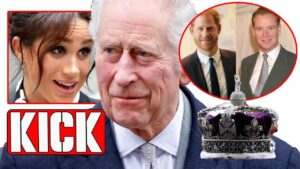Prince Harry’s recent testimony in the phone hacking case has stirred up a whirlwind of attention and debate.
While shedding light on the invasion of privacy he and his family endured, some aspects of his statement have come under fire.
One notable point of contention was Harry’s slip-up in referring to his father as His Royal Highness King Charles III instead of the correct title, His Majesty King Charles III.
This mistake has ignited discussions about Harry’s understanding of royal protocol and his attention to detail, prompting questions about his adherence to traditional customs.
Moreover, critics have raised eyebrows at Harry’s consistent use of the term “organization” when discussing his family and security matters.
This choice of language has been interpreted as painting the royal family in a detached, impersonal light rather than a united and supportive unit, hinting at Harry’s shifting perspectives on the role and dynamics within his royal family.
In addition, Harry’s reference to his late mother as Princess Diana instead of her official title, Diana Princess of Wales, has reignited conversations about tradition, communication, and its emotional impact on her children.
The deliberate choice to evoke sentimental responses towards his mother suggests a strategic attempt to appeal to the public’s emotions.
Perhaps the most shocking revelation from Harry’s testimony was his acknowledgment of long-standing rumors implicating James Hewitt, a former cavalry officer, as his biological father.
While not directly related to the phone hacking case, this disclosure has sparked debates about its relevance and the underlying motives for its inclusion.
Some critics argue that Harry’s mention of paternity rumors detracts from the primary issue at hand, while others view it as shedding light on his personal struggles under intense public scrutiny as a member of the royal family.
Overall, Prince Harry’s witness statement has faced criticism for breaches in royal protocol and for delving into unrelated personal matters.
These critiques have raised doubts about his dedication to royal responsibilities, grasp of his heritage, and credibility in the eyes of the public.
As the legal proceedings unfold, the implications of these revelations on both the case and public perception remain uncertain.
The ongoing discussions surrounding Harry’s relationship with the royal family and the blurred line between his public and private life continue to captivate audiences.
Meghan Markle and Prince Harry have cleared their schedules in anticipation of a potential invitation from Prince Charles to visit Balmoral, amidst his battle with cancer.
An insider close to the couple revealed their eagerness to mend ties with Charles this summer, expressing readiness to reunite and spend quality time with their children, Archie and Lilibet.
Despite the couple’s hopes for reconciliation, experts caution that the rift between Prince William and Prince Harry is unlikely to heal soon, with no formal invitation extended by King Charles as of yet.
Sources suggest that any potential invitation may hinge on the condition that both children accompany Harry and Meghan, as Charles reportedly seeks to meet his grandchildren for the first time and establish a bond with them.
Speculation looms over potential changes to the line of succession, with suggestions that King Charles may consider excluding Archie and Lilibet unless he meets them in person.
Reports indicate that any invite to the Sussexes may be more of a formality than a genuine desire by the British royal family to engage with Meghan and Harry.
Despite efforts for reconciliation, a brief encounter between Prince Harry and King Charles reportedly ended abruptly, highlighting lingering tensions and suspicions within the royal household.
Amidst Prince Charles’ health battle, Prince Harry’s swift response to his father’s condition showcased his familial commitment despite physical distance.
However, unresolved conflicts and mistrust within the royal family suggest that true reconciliation may remain a distant prospect for the foreseeable future.
